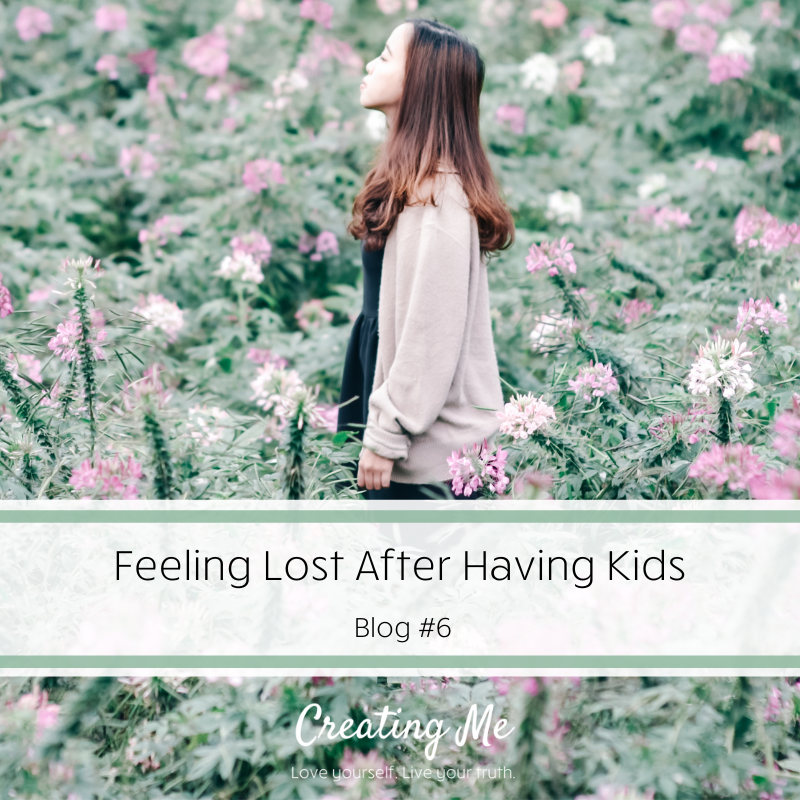Feeling Lost After Having Kids
After having kids, most moms go through a period where they feel kinda lost. They lose touch with who they were before, and eventually rebuild their new identity as a parent.
Research from Dr. Elizabeth Laney and her colleagues shows that we all re-build our identity a little differently.
Some moms end up defining themselves very closely with their kids. Other moms maintain a strong individual identity.
Where we land on this spectrum matters, because it affects our emotional well-being and how effectively we can parent.
Step 1: When your identity crumbles
Think about your identity as a jigsaw puzzle. Each aspect of your identity – your education, zest for cooking, love of dogs, and career ambition – is like a puzzle piece. When you put them all together, the completed puzzle becomes your self-identity.
Then, just as you start to figure out who you are as an adult, you have baby.
Your baby’s needs are frequent, intense and immediate. You become so focused on feeding, burping, soothing, bathing and laundry, that you stop cooking the 3-course meals you once loved. You stop dreaming about your career, because it’s all you can do to get to the bottom of your inbox before you’re exhausted. The pieces of your pre-baby identity start to fall away and you can feel like you’ve lost yourself.
Step 2: Re-building your identity to include your children
The upside of losing your identity is that you’re gifted the chance to ask, “Who do I want to be now?”
One important aspect of re-building our identity is how closely we define ourselves by our kids.
How your kids define you
On some level, we all carry our children’s needs with us (which, quick reminder, constitutes mental work! Having someone else’s needs to think about is work, Mama. Give yourself credit!)
Essentially, we start picking up the puzzle pieces of our pre-baby identity and figuring out how to combine them with new pieces related to motherhood. Eventually, a new puzzle takes shape.
Some of us incorporate our kids heavily into our new puzzle, such that our lives become entirely about our kids. Others end up with a puzzle that looks similar to our pre-baby identity.
And where we land on this spectrum matters.
Fused with your kids
Researchers call it “fusion” when a mom defines herself largely by her children. These moms tend to see their own emotions ebb and flow with their kids’ emotions and behaviours.
For example, consider the intense pride of a mother who sees her son tie his shoes for the first time. Or, on the flip side, the anger you might feel when your child misbehaves.
It can be difficult for moms who are highly ‘fused’ to separate their emotions from their parenting choices. For example, one mother in this study described how angry she felt when her daughter lied. And, because our emotions fuel our actions, her anger drove her to feed her daughter a spoonful of hot sauce as a punishment for lying.
Highly independent
Some women integrate their children far less into their identity. Researchers call this “freedom.” Moms at this far end of the spectrum are less likely to notice their children’s needs, which also makes it difficult to respond effectively.
Finding the sweet spot
Researchers suggest that there’s a sweet spot, where moms are attuned to their kids’ needs, but don’t let their children completely define them.
When we rebuild our identity in this balanced way, we can be aware of our kids’ nuanced needs – and even how one child may be different from another – and reflect on our own response to each situation. Yet, we keep enough emotional distance that we don’t ride the emotional roller coaster with our kids.
Practical steps
Maybe you are square in the middle of your identity crumbling and looking for advice to re-build. Or maybe you’ve already re-defined yourself, but noticed that you feel either too fused, or too distant from your kids.
Here are a few tips, offered by Dr. Elizabeth Hall, for finding the sweet spot:
Self-reflection is key. Talking about parenting can help raise self-awareness and develop your identity. This can be a solo activity, like journaling or drawing. Or, it could be social, like talking to a friend who’s good at listening.
How were you parented? Research shows that parenting identities are often passed down through generations. Think about how you were you parented. What was that like for you? How are you parenting similarly? Differently?
Moving on the spectrum. Whether you need some separation from your kids, or want to be more connected, you can move on the spectrum.
Creating separation: Start doing something outside your kids, like going out with friends or taking up a new hobby. At first, you might have to do this against your own will, but you’ll feel more balanced in the long-term.
Creating connection: Practice seeing the world through your child’s eyes and baking empathy into your parenting. For example, reflect on the last time your child did something that drove you nuts. Ask yourself:
How were they feeling? Why?
What could you do to meet their needs, while still honouring household rules?
Book a free coffee chat
Could you use a little support to get through this rut, Mama? Let’s have coffee.
During a free, virtual coffee chat, we’ll talk about your unique situation and figure out:
What’s not working
What you want instead
The pathway to get there
From there, we can explore whether Creating Me offers the right tools to help you reach your goal. And if we don’t, I’ll connect you with other resources that might fit better.
